
Why climate change is such a concern
For more details via infoboxes: hover, click or double-click on any highlighted text
Flooding in Jakarta, Indonesia
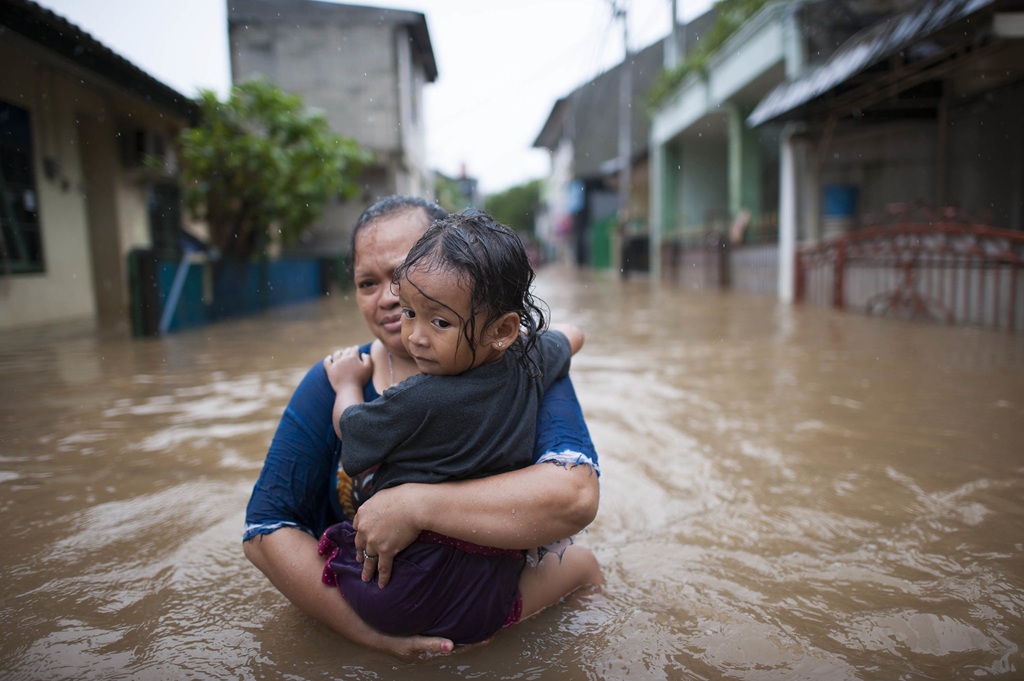 World Meteorological Organization [1]
World Meteorological Organization [1] - average temperatures have increased, and there are more storms, floods, heatwaves and wildfires
- sea levels are rising
- the effects are cumulative and irreversible with current technology
- climate deaths - e.g. each year's CO2 emissions from the UK will result in around 150,000 climate deaths
- climate refugees
- loss of biodiversity, e.g. coral reef blanching
- sea levels are rising and the more CO2 that is added to the atmosphere, the faster sea levels will rise.
- One way or another, large scale use of fossil fuels will end.
- in the Paris Agreement, countries made commitments to limit global warming to well under 2°C (often taken to mean 1.7°C), and to pursue efforts to limit it to 1.5°C
- this meant rapidly ending the use of fossil fuels, halving global CO2 emissions by 2030, with faster emission cuts in developed countries
- these commitments required "rapid and far-reaching transitions"throughout society
- but governments have not acted in line with the promises given - actions have been completely at variance with the speed of change needed.
- the global total of CO2 emissions has continued to rise
- in developed countries, emissions are not falling in line with promises made
- the global temperature rise (longer term average) reached around 1.3°C in 2024 - and at its current rate will reach 1.5°C in 2030, and 1.7°C in 2036
- extreme weather events are increasing
- the risks of catastrophic tipping points are steadily increasing.
- governments have poor records of decision making on important topics
- the UN Secretary-General has warned: "Some government and business leaders are saying one thing - but doing another. Simply put, they are lying."
- despite the global temperature rise being likely to reach the Paris agreed limit of 1.5°C in 2030, governments continue to talk about Net Zero 2050 as if this is an acceptable timescale
- climate protesters who are very aware of the situation are very vocal and not deterred by long prison sentences.
Mankind has changed the climate
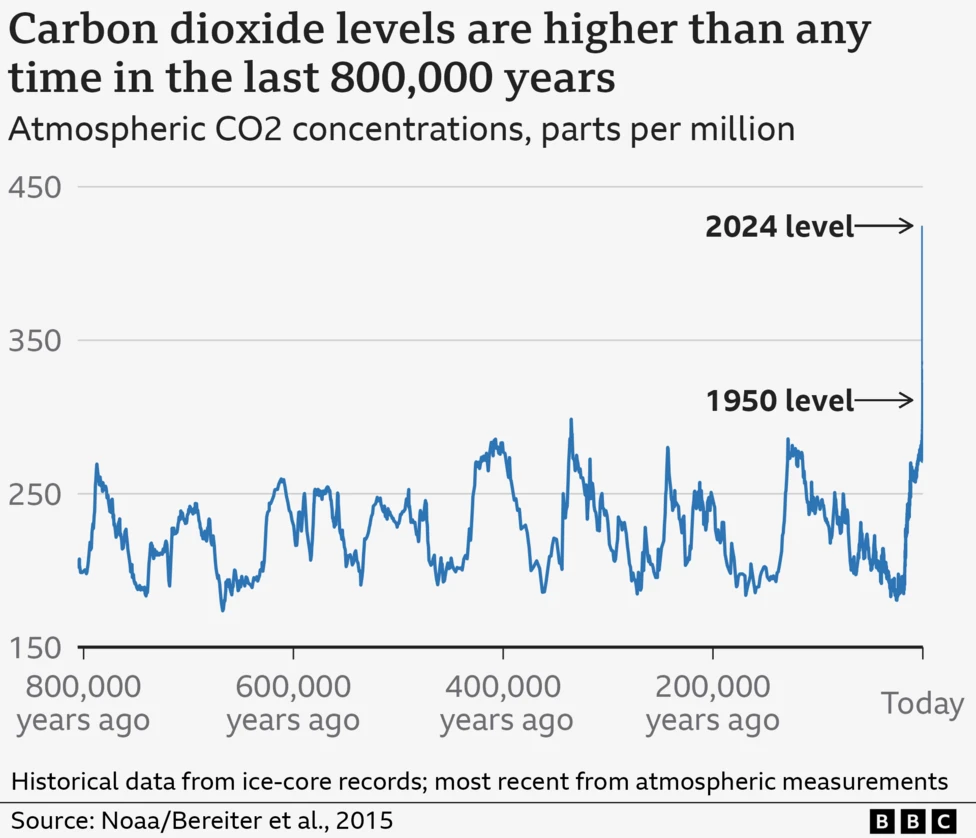
- more storms and floods - and of greater severity
- more droughts, heatwaves and wildfires - and of greater severity.
The consequences for life on earth are severe
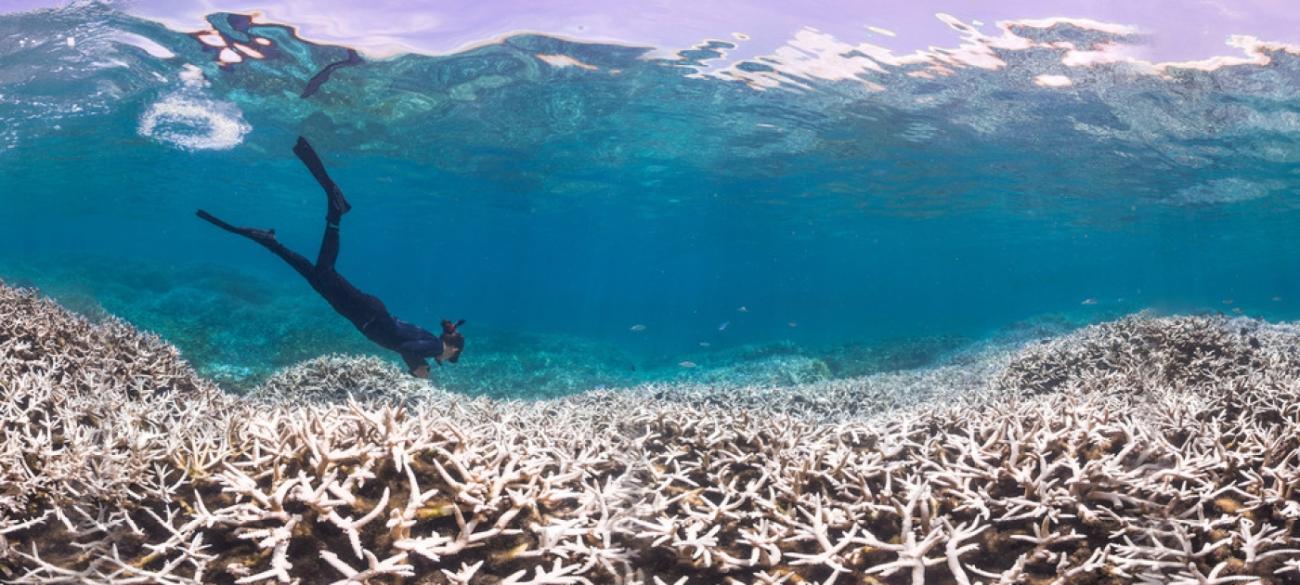
Coral reef bleaching
Photo: ©The Ocean Agency/Ocean Image Bank
Photo: ©The Ocean Agency/Ocean Image Bank
The lifetime emissions from six average UK residents are sufficient to cause one climate-related death, and several refugees
Some areas of the world are particularly affected, e.g. coral reefs are being destroyed.
The changes are progressive and irreversible by current technology
The effects are progressive - e.g.- if global warming reaches 2°C, most coral reefs will have been permanently lost
- the more CO2 is added to the atmosphere, the faster sea levels will rise, and the sooner low-lying coastal areas will need to be evacuated
- as the temperature rises, there is an increasing risk of reaching tipping points, i.e. points at which large irreversible catastrophic changes will occur, such as changes in ocean currents.
But the consequnces are not equally distributed
The distribution of tropical cyclones
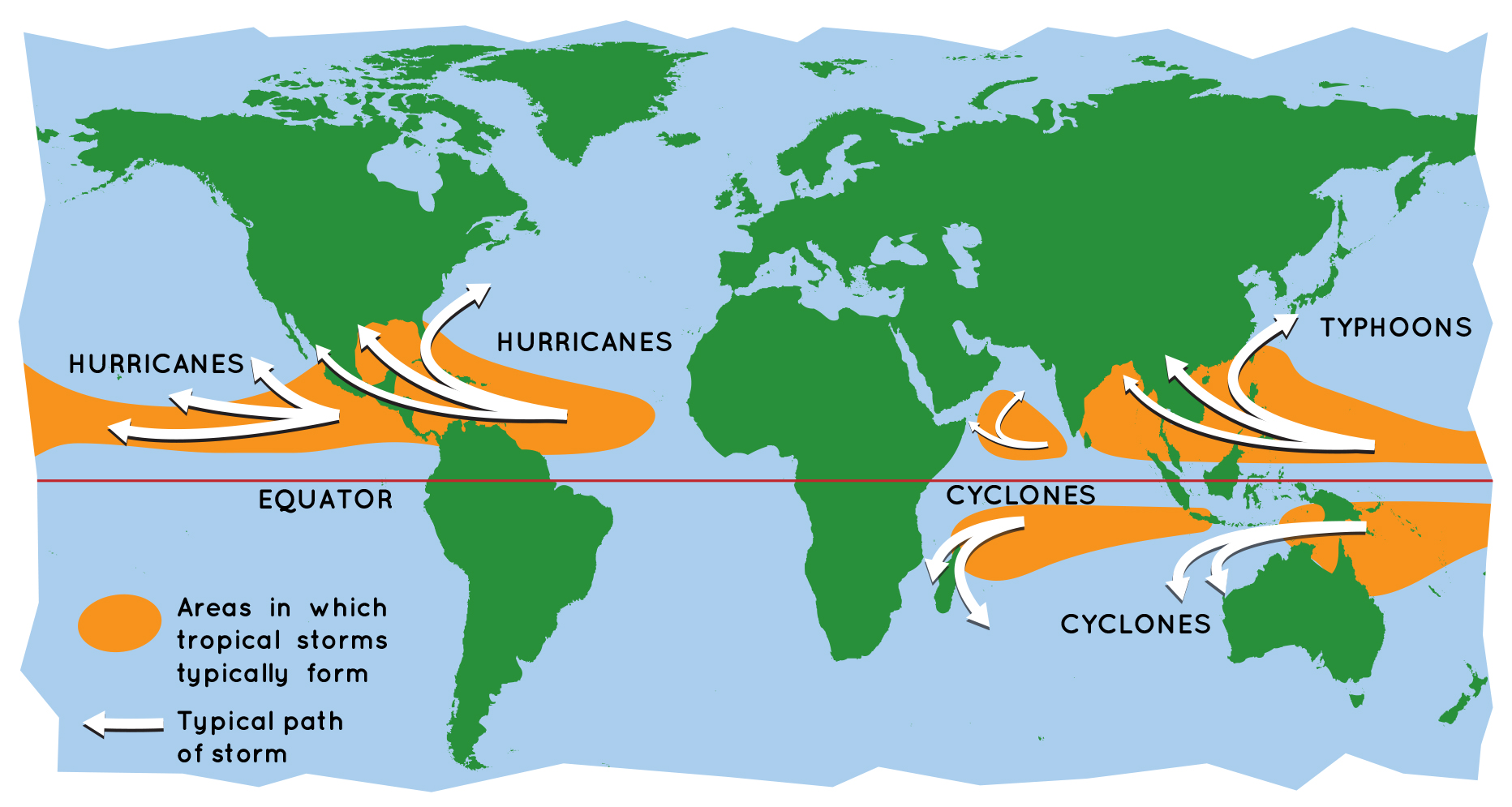 Attribution: Nasa Spaceplace
Attribution: Nasa Spaceplace - It is the hottest parts of the world that are affected most by rising temperatures.
- It is the Caribbean and south-east Asia that are most affected by the increased severity of tropical cyclones (also termed hurricanes and typhoons depending on location).
- It is the low-lying parts of the world that are most affected by rising sea levels - including low-lying Pacific islands, and parts of Bangladesh.
- It is the richest countries that are generating the CO2 emissions and the poorest countries that are suffering the worst effects, resulting in a gross injustice.
The richest countries are the most responsible for climate change but are the least affected
Extremes of heat can be seen as beneficial in rich countries
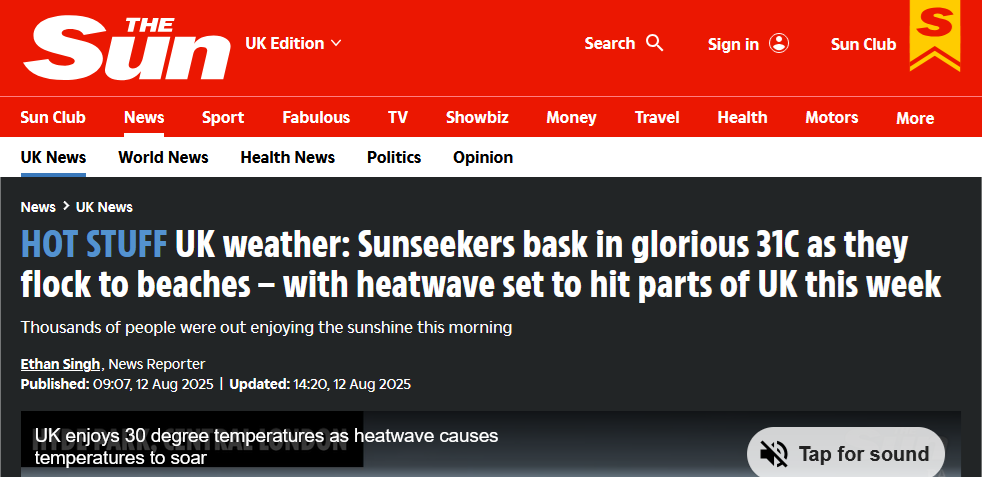
But the consequences of climate change are worst in the Global South, far away - and so climate change is often seen as unimportant in the north - and extremes of heat are often seen as beneficial.
So there is much complacency about climate change in developed countries.
The poorest countries are the most affected by climate change but are the least responsible
Extremes of heat are seen very differently in poorer hotter countries
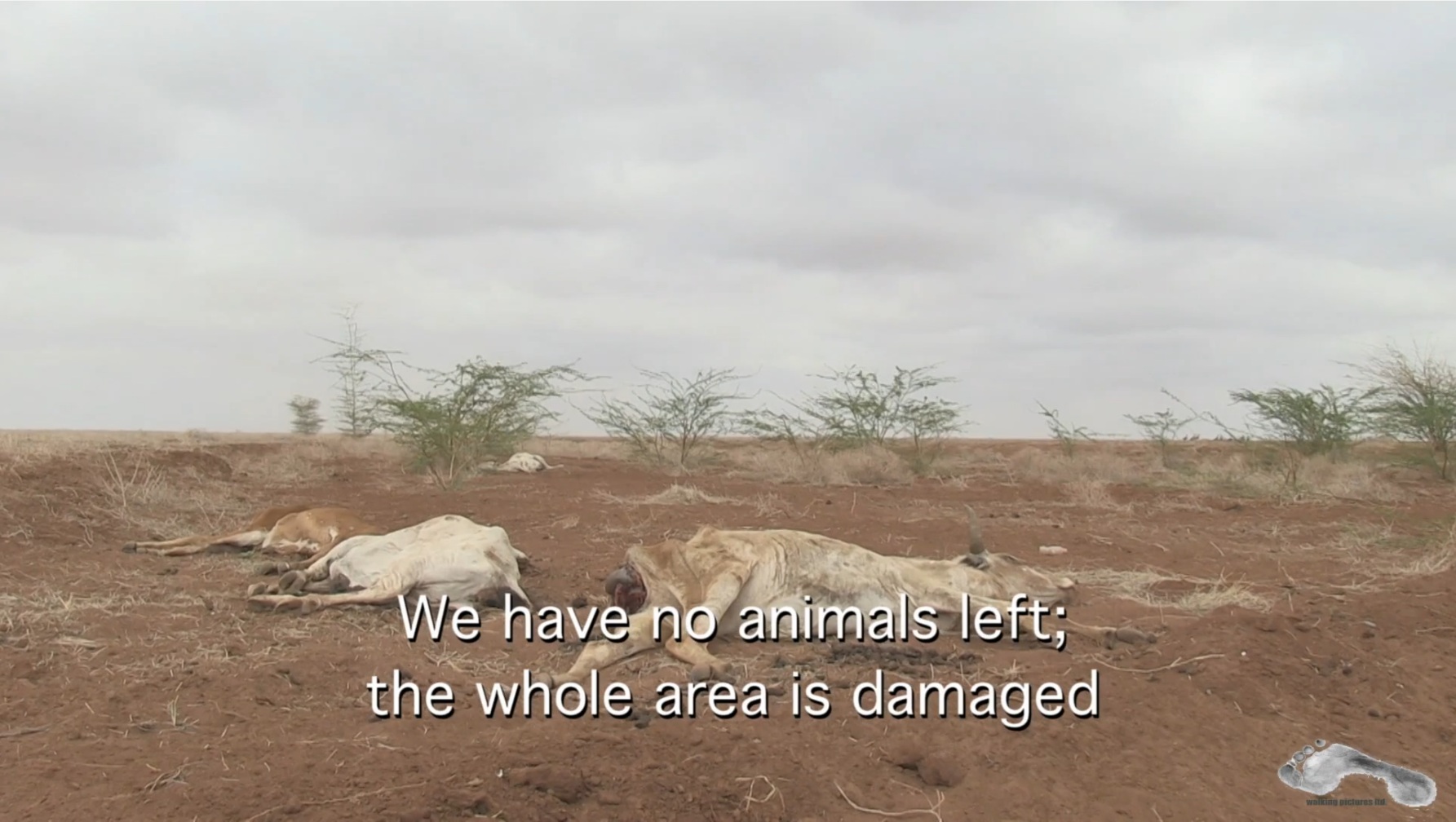 Attribution: Walking Pictures [2]
Attribution: Walking Pictures [2] This amounts to a gross injustice. The comfortable lifestyles in the rich countries are obtained at the expense of inflicting deaths and misery on the planet's poorest communities.
The current debates over ending the use of fossil fuels are akin to the debate in the UK in the 1830s over whether to end slavery.
This injustice is not just geographical - it is temporal as well. Future generations will have to cope with the continuing consequences of climate change, including steadily rising sea levels, despite bearing no responsibility for them.
Promises were made to limit the harm from fossil fuels, but have not been kept
- In the Paris Agreement of 2015,countries made commitments to limit global warming to well under 2°C (usually taken to mean 1.7°C), and to pursue efforts to limit it to 1.5°C
- this meant rapidly ending the use of fossil fuels, halving global CO2 emissions by 2030, faster in developed countries
- the scientific advice was that these commitments required "rapid and far-reaching transitions"throughout society
- but developed countries have not reduced emissions as promised and the global total of CO2 emissions has actually increased
- despite the global temperature rise being likely to reach the Paris agreed limit of 1.5°C in around 2030, governments continue to talk about Net Zero 2050 as if this is an acceptable timescale
- government actions are completely at variance with the speed of change needed
- there has been continued road building and airport expansion
- the needs to insulate houses and reorganise food supply have largely been ignored.
The climate has continued to deteriorate

- the global total of CO2 emissions has continued to rise
- the global temperature rise (longer term average) reached around 1.3°C in 2024- and at its current rate will reach 1.5°C in 2030, and 1.7°C in 2036.
- if the original climate target limit of 1.5°C has to be replaced by 1.6°C, there will be an estimate 400 million more climate deaths, of which the UK will be responsible for 300,000 deaths [3]
- extreme weather events are continuing to increase.
The risks of catastrophic tipping points are steadily increasing
If global warming continues, and the climate continues to deteriorate, tipping points in the climate system will be passed and changes will become abrupt and/or irreversible.The effects on the planet including mankind will then accelerate.
The most important tipping points are
- melting of ice e.g. irreversible meltdown of the Greenland ice sheet
- disruption of ocean currents and atmopheric circulation e.g. collapse of the oceanic Atlantic Meridional Overturning Circulation (AMOC)
- biosphere tipping points including large-scale dieback of the Amazon rainforest.
Governments cannot be relied on in crucial decisions
- governments have a poor record of decision making, e.g. in the UK, there is a recurring pattern of wasting billions of pounds on ineffective policies and ignoring effective policies, e.g.
- errors in the preparation for pandemics
- errors in procurement at the start of the covid-19 pandemic
- errors in procuring NHS IT
- the UN Secretary-General
- has warned: "Some government and business leaders are saying one thing - but doing another. Simply put, they are lying."
- has praised protesters for sounding the alarm
- climate protesters who are very aware of the situation are very vocal and not deterred by long prison sentences
Citizens should be very concerned and get involved
Those who feel that decisions should be based on facts and fairness should be very concerned about climate change because- it is a very serious problem - the biggest that humanity has faced - in terms of human deaths, refugees and changes to the natural world
- the changes to the climate are progressive and irreversible
- governments have been making very poor decisions, and are showing no sign of improvement
- the current course is to disaster
- future generations and those living in vulnerable situations around the world deserve much better than this.
Citizens should
- aim to understand the science of climate change and the science of effective policy making
- collaborate with others to plan an effective response.
References
| [1] | https://www.flickr.com/photos/shanghaidaddy/382761698/in/faves-163849083@N02/ (accessed 16 Nov 2025) - licensed by https://creativecommons.org/licenses/by-nc-nd/2.0/deed.en |
| [2] | Walking Pictures (2023) Oily Voices from Kenya https://vimeo.com/874877815 |
| [3] | https://carbonindependent.org/carbonbudgets.php |
First published: 13 Feb 2025

 ✖
✖